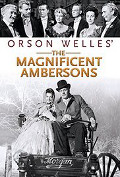
Directed by
Orson Welles
88 minutes
Rated PG
Reviewed by
Bernard Hemingway

Magnificent Ambersons. The
Set in the early 1900s, Welles's second film tells the story of the Ambersons, an upper-class Indianapolis family, and in particular Major Amberson's grandson, George (Tim Holt), as they gradually slide from wealthy old school Establishment to virtual paupers, pushed aside by the changing forces of capitalism.
Welles’s follow-up to his landmark debut, Citizen Kane (1941), based on the 1918 novel of the same name by Booth Tarkington that Welles had adapted in 1939 for his Mercury Theatre of the Air radio show, was famously hacked to pieces by RKO who chopped 50 minutes out of it and tacked on a new, happier ending which was shot by assistant director Fred Fleck, editor Robert Wise, and Jack Moss, the business manager of Welles's Mercury Theatre. Even so it is still regarded in some quarters as a masterpiece and even Welles’s finest film.
This view to me smacks of wishful thinking if not critical pretension. Aside from the question of what the film would have looked like had Welles not lost control of the final cut (after the film failed to excite audiences at previews he realised that it needed re-cutting but he was working on a war-time propaganda film in Brazil at the time and his extensive notes for how he wished the film to be cut were not followed), it not only lacks the emphatic technical bravura of Citizen Kane, Stanley Cortez’ fine photography notwithstanding, but more importantly exchanges the dominant central figure of Welles’s Kane for Tim Holt’s George Amberson Minafer, who is less the arrogant scion that he is supposed to be than an insufferable prat who in no way merits the attention that plot gives him.
Further the film has a rather mustily self-important air (reflected in Welles’s spoken end credits) that far exceeds what is actually achieved. Put simply there is little sign of magnificence here. Needless to say it is conjecture whether Welles's version would have in fact been a masterpiece (unfortunately the cut footage was destroyed some years later, so we will never see a restored version) however Bernard Hermann was so incensed at having his score chopped up that he insisted on having his name removed from the credits. So whilst this is an acknowledged tragedy, at least on the basis of what is left (and there must be some debate as to whether it is legitimately a Welles' film) The Magnificent Ambersons is certainly NOT one of the finest American films ever made.
FYI: In 2002, a television movie directed by Alfonso Arau was made using the Welles screenplay and his editing notes however it lacked several scenes that are in the 1942 version and also has essentially the same happy ending.
Want something different?





